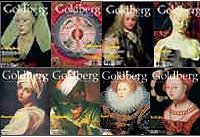GOLDBERG MAGAZINE
A quarterly magazine of early music
120 pages.
60 FF, £6.50, $12.50, 1,250 PTA. http://www.goldberg-magazine.comIn the niche market that is classical music, there is an even smaller niche market: that of early music. Sublime sounds for some, characters dressed up in funny costumes playing screechy instruments for others, early music divides classical music listeners into the HIP and non-HIP.
HIP is an acronym standing for historically-informed performances; essentially the purview of early and baroque music ensembles, this "philosophy" is spreading, with a great deal of 19th century music being performed on original instruments and in "authentic" manner.
Accordingly, it might come as a surprise that a magazine exists that deals with early and baroque music and nothing else. While classical music is suffering, and classical music magazines losing readers, Goldberg manages to live on. This large-sized, glossy, color magazine looks, at first glance, more like a fashion magazine than a music publication (not because of its content, but because of its production). Published quarterly, it focuses on one important composer per issue, and features interviews, news, reviews and more.
The approach is resolutely international - a reflection of the world of early music, the proponents of which cross borders with the ease of the musicians whose music they play. Goldberg is published in two bilingual editions - Spanish/English and French/English. While this can lead to some confusing layout, it allows the magazine to reach a much larger audience than if it were just in one language.
Recent issues have featured extensive articles on William Byrd, Heinrich Schütz, Claudio Monteverdi and François Couperin, giving historical and cultural context to these composers, and presenting some of the key discography for those who wish to discover their music.
Especially interesting, in issue 15, is a delightful interview with Emma Kirkby. The magazine also runs an irregular series of interviews with the owners of early music record labels.
While the contributors to Goldberg include prestigious critics and musicologists, the articles are highly accessible to all. Lovers of early and baroque music would certainly do well to check out this magazine, to learn more about the music they listen to, and to have an attractively produced magazine to read every three months.
Kirk McElhearn
CONTACT

